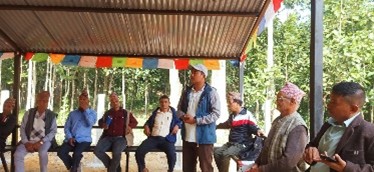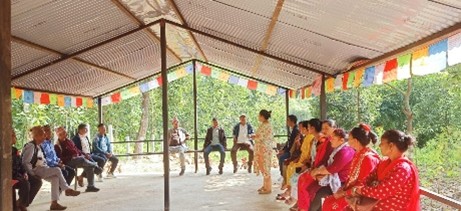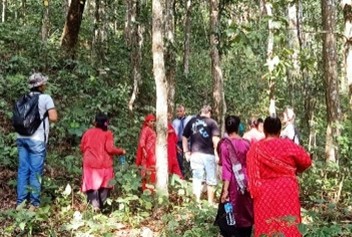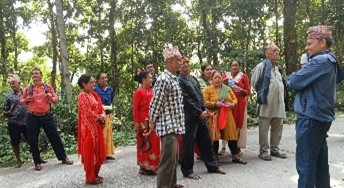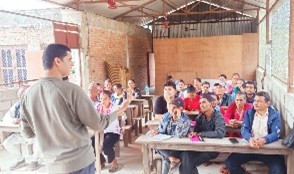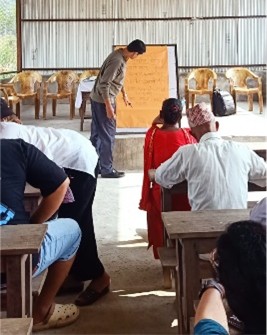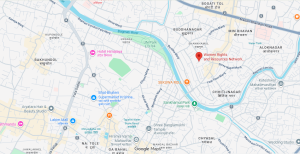- BUNGDAL CFUG
The three-day training program, organized at Bungdal Community Forest from November 16 to 18, 2024, was attended by 25 participants including members of Bungdal Community Forest. The program aimed to enhance participants’ knowledge and skills in silvicultural operations through a combination of theoretical and practical sessions. The sessions were facilitated by Mr. Sanjeev Bhattarai and Dr. Yogendra Yadav, who provided their expertise in silviculture and sustainable forest management practices. The program was started by providing an overview of the three-day program agenda, highlighting the objectives and key activities planned. The general introduction and overview of the program ensured participants were well-informed about the purpose and structure of the training, creating a smooth flow for the sessions and fostering
Day 1: Presentation and Understanding of Silviculture
On the first day of the training program, participants were introduced to the theoretical understanding of silvicultural operations. The presentations began with an overview of the fundamental principles of silviculture, which included in-depth discussions on stand dynamics, the stages of tree growth, and methods to promote forest regeneration. The contents provided by facilitators were very insightful for understanding specific silvicultural techniques for forest management such as thinning, which helps reduce competition among trees; pruning, which improves tree quality and health; and controlled burning, a method used to reduce fuel loads and encourage ecological balance.
Day 2: Field Visit and Group Work in Community Forests
On the second day, the program commenced with a briefing session where the facilitator explained the planned activities for the day. Participants were divided into four groups, each tasked with specific responsibilities to ensure a systematic and productive experience. Upon arriving at their respective Community Forests (CFs), the participants initially engaged in practical tasks such as weeding designated areas to improve forest health. This was followed by thinning and pruning activities, where participants learned to remove overcrowded and unhealthy trees to enhance the growth of remaining trees.
Day 3: Visit to Rapti Division Office and Dipad Community Forest
The final day of the training program began with a short visit to the Rapti Division Office, where Mr. Suresh Gupta, Assistant Forest Officer (AFO), delivered a briefing on key initiatives and ongoing efforts in the region’s forest management. Following this, the participants proceeded to the Dipad Community Forest (CF) for an exposure visit.Upon arrival, Dammar Bahadur Moktan, the Chairperson of Dipad CF welcomed the participants and provided an in-depth briefing on the history of CF including its area, benefitted households, number of male and female, etc. along with its challenges during previous days, and achievements at present context. He explained that Dipad CF was established in 2063 B.S. and covers an area of 170.89 hectares.The chairperson also shared a pivotal incident from 2078 B.S., when a devastating windstorm caused significant damage, toppling nearly 900 trees. Initially met with disbelief, a ministerial investigation confirmed the windstorm as the true cause of the destruction.
- Piple Pokhara CFUG
The three-day training program, organized at Piple Pokhara Community Forest from November 19 to 21, 2024, was attended by 25 participants including members of the Piple Pokhara Community Forest. The program aimed to enhance participants’ knowledge and skills in silvicultural operations through a balanced combination of theoretical and practical sessions. The sessions were facilitated by Dr. Yogendra Yadav, who provided expertise in silviculture and sustainable forest management practices. Ms. Pratikshaya Bhandari, Forestry Associate of the Women Rights and Resource Network (WRRN), served as the moderator. She inaugurated the program by providing an overview of the three-day agenda, emphasizing the objectives and outlining the key activities planned. Her introductory session ensured participants were well-prepared for the sessions, creating a structured flow and fostering active engagement throughout the program.
Day 1: Theoretical Presentation and Understanding of Silviculture
The first day of the training program focused on the theoretical foundation of silvicultural operations. Dr. Yogendra Yadav initiated the presentations with an in-depth discussion on the fundamental principles of silviculture, addressing stand dynamics, the stages of tree growth, and strategies to encourage forest regeneration. Key silvicultural techniques, such as thinning, pruning, and controlled burning, were explained in detail. Thinning, aimed at reducing competition among trees, pruning to improve tree quality and health, and controlled burning as a tool for ecological balance were highlighted.
Day 2: Field Visit and Group Work in Community Forests
On the second day, the program began with a briefing session where the facilitator outlined the planned activities. Participants were divided into four groups, each assigned specific tasks to ensure systematic learning. During their visit to the Piple Pokhara Community Forest, participants undertook practical tasks such as weeding to enhance forest health, thinning to reduce overcrowding, and pruning to promote the growth of healthier trees.
Day 3: Visit to Rapti Division Office and Dipad Community Forest
The final day of the training program commenced with a short visit to the Rapti Division Office, where Mr. Suresh Gupta, Assistant Forest Officer (AFO), provided a briefing on the key initiatives and ongoing efforts in the region’s forest management. Following this, participants visited the Dipad Community Forest (CF) for an observation session.
Upon arrival at Dipad CF, Mr. Rupak Bojam, in-charge of the Rapti Division Office, welcomed the participants and shared an insightful overview of the forest, reflecting his thorough understanding of its history, challenges, and progress. Established in 2063 B.S. and covering 170.89 hectares, Dipad CF introduced Scientific Forest Management (SFM) practices in its operational plan developed in 2072 B.S., including systematic thinning, regeneration cuts, and selective harvesting.Mr. Bojam recounted a significant incident in 2078 B.S., when a windstorm caused substantial damage, toppling nearly 900 trees. A subsequent ministerial investigation confirmed the windstorm as the cause, and the community salvaged the fallen trees.Dipad CF has also implemented several proactive measures, such as constructing a 6 km fire line to prevent forest fires, achieving a three-to-four-year streak without incidents. Regular monitoring by three guards and additional seasonal workers during fire line construction has enhanced forest protection while providing local employment opportunities. Strict regulations, including penalties for violations, have been enforced to maintain forest integrity.Sustainable practices, such as thinning, pruning, and enrichment planting, have been pivotal in ensuring forest health and productivity. Furthermore, the establishment of three compost pits for converting organic waste into compost manure has supported soil health and contributed economically through sales, with the revenue reinvested into community and forest development activities. Dipad CF’s new five-year operational plan, currently under review for 2079 B.S., reflects its commitment to sustainable management.
- Chuchhekhola CFUG
The three-day training program, held at Chuchhekhola Community Forest from November 22 to 24, 2024, brought together 25 participants including members of the Chuchhekhola Community Forest User Groups. The program aimed to strengthen participants’ knowledge and skills in silvicultural operations through a balanced approach of theoretical and practical sessions. The training sessions were led by Dr. Yogendra Yadav who shared his expertise in silviculture and sustainable forest management practices.Ms. Pratikshaya Bhandari, Forestry Associate of the Women Rights and Resource Network (WRRN), moderated the program. She commenced the event by outlining the three-day agenda, emphasizing the objectives and planned activities. Her clear and structured introduction set the tone for the program, ensuring that participants understood the goals and were actively engaged throughout the sessions.
Day 1: Theoretical Presentation on Silvicultural Practices
The first day focused on the theoretical foundations of silvicultural operations. Dr. Yogendra Yadav introduced participants to the core principles of silviculture, covering topics such as stand dynamics, tree growth stages, and forest regeneration techniques. Specific silvicultural methods like thinning, pruning, and controlled burning were discussed in detail, highlighting their role in improving forest health and ecological balance.Dr. Yadav also emphasized the broader applications of silviculture, including its contributions to biodiversity conservation, climate change mitigation, and economic sustainability in forest management. He stressed the importance of tailoring these practices to the ecological and social contexts of participants’ respective forests. The day concluded with an interactive session, where participants discussed challenges and opportunities in implementing these practices, fostering an exchange of ideas and experiences.
Day 2: Fieldwork and Group Activities
The second day began with a briefing on the day’s activities, after which participants were divided into four groups, each assigned specific tasks. During the field visit, participants engaged in practical activities such as weeding, thinning, and pruning in designated forest areas to enhance forest health and growth.In the second session during the day, the groups conducted forest inventories. Trainers guided participants in measuring tree diameters, calculating tree densities, and assessing forest conditions. These hands-on activities allowed participants to apply the theoretical knowledge from the previous day, deepening their understanding and equipping them with the skills needed for practical implementation in their own community forests.
Day 3: Visit to Rapti Division Office and Dipad Community Forest
The final day began with a visit to the Rapti Division Office, where Mr. Suresh Gupta, Assistant Forest Officer (AFO), provided an overview of the region’s key forest management initiatives. The participants then visited Dipad Community Forest (CF) for an observation tour. Upon arrival, they were welcomed by the CF’s treasurer, who delivered a detailed briefing on the forest’s history, challenges, and achievements. Dipad CF, established in 2063 B.S. and spanning 170.89 hectares, had implemented Scientific Forest Management (SFM) practices in its operational plan developed in 2072 B.S. Although SFM was discontinued nationwide in 2078 B.S., Dipad CF has continued to innovate and adapt its management strategies.The treasurer recounted a significant event from 2078 B.S., when a windstorm caused substantial damage by toppling around 900 trees. The incident was initially met with skepticism, but a ministerial investigation confirmed the windstorm as the cause. The community turned the situation into an opportunity by salvaging the fallen trees and generating NPR 3.5 crore from their sale.Additionally, the treasurer outlined proactive measures taken by Dipad CF to prevent forest fires, including the construction of a 6 km fire line and the hiring of regular and seasonal guards for forest protection. These efforts not only ensured the forest’s safety but also provided employment opportunities for the local community. Strict rules and penalties were enforced to deter violations, further supporting the forest’s sustainable management.Participants also learned about enrichment planting, compost pit initiatives for soil health, and revenue generation through compost manure sales. A new five-year operational plan, currently under review for 2079 B.S., was also highlighted.The visit concluded with a tour of the forest, where participants observed its structure, species composition, and the outcomes of various silvicultural practices. This hands-on exposure provided a comprehensive understanding of sustainable forest management principles in action, leaving participants inspired by Dipad CF’s exemplary practices.The training program successfully combined theoretical knowledge with practical experience, enhancing participants’ understanding of silvicultural operations and equipping them with skills to apply in their community forests. The visit to Dipad CF served as an inspiring example of sustainable forest management, marking a fitting conclusion to the program and motivating participants to implement similar practices in their own forests.





















